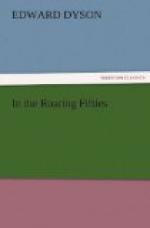‘Think over what I have told you.’
‘There is more behind?’ ‘There may be.’
‘You think I will join you?’
’In my present career? No. For the time being, let us say no more. I need not ask you to be silent. Meet me here to-morrow night at nine. While you are thinking, bear always in mind the fact that Peter Cannon is there ‘—he pointed in the direction of Stony’s tent—’ a living man. Good-night.’
The reminder was well timed; pity stirred warmly in Jim’s heart again, and he offered his hand.
‘So long,’ he said, dropping into the vernacular of mateship.
Ryder took his hand with no demonstration of emotion. ‘So long,’ he replied.
XVI
Burton found his mate gloomy and taciturn all next day, a condition so remarkable in Done that it gave Mike some little concern, but he made no comment; and Jim was too absorbed in the strange, new development in his life to discover his friend’s uneasiness. Ryder’s story brought Jim’s youthful sufferings back to him with painful vividness; it awakened some animosities he had thought dead, and he recognised, though shrinking from the idea with actual terror, in Ryder’s attitude towards his kind the frame of mind into which he was drifting when he broke away from Chisley and its associations. Remembering well his own heart up to the time when human interests and sympathies began to awaken kindred emotions within him, he understood that the resemblance between himself and his brother was as close on the moral side as it was on the physical, but with Ryder the demoralizing influences had worked their utmost. How like their sufferings had been! differing only in degree; but his own sufferings looked pale and fanciful now beside those of his brother. His afflictions were of the spirit only. He and Ryder were of a supersensitive race and every soul-pang he endured had been augmented a thousand times in his brother’s case, and driven in by the prison cell, the leg-irons, the loathsome associations, the animalizing toil in the quarries—the lash! Jim had heard enough of the infamy of the system to understand, if not the worst, sufficient to make his skin creep at the thought of it. He realized to what state of heart and mind Ryder had been driven, knowing how he himself had developed under the stress of comparatively trivial wrongs, and the whole man ached with sympathy. It required a strong effort to restrain his inclination to tears, a weakness of the flesh he had surprised in himself before now.
And Ryder had suffered all this, knowing himself to be guiltless of the crime of which he was convicted. Stony was there in his tent. If Jim had known where to find his brother he would have gone to him in the morning, prompted by the generous affection that had sprung in his heart, feeling that Ryder might be won over by new friendships and new interests. It seemed to him that the wholesome effects worked in his case might be repeated in that of his brother, forgetting their disparity in years. The change had come to him while he was yet little more than a boy; Ryder was a man in middle life, and no longer capable of youth’s saving enthusiasms.




